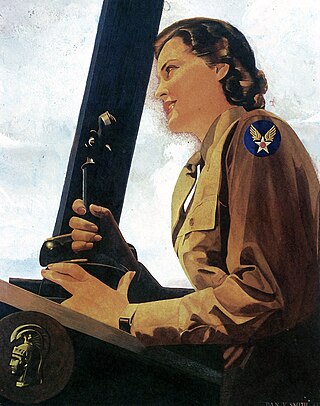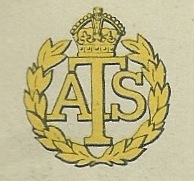Footnotes
- ↑ Colonel R. H. Beadon, The Royal Army Service Corps, Vol.II, Cambridge University Press, 1931, p.16
A staff clerk is a professional specialist clerk in the British Army who is a member of an administrative corps, as opposed to a unit clerk, who is a member of the corps or regiment in which they work and is trained first and foremost in the duties of that unit (such as an infantryman).
Staff clerks predominantly work in headquarters units alongside staff officers, hence the name. Clerks working in headquarters were consolidated into the Army Service Corps (later Royal Army Service Corps) during the Boer War. [1] In the McLeod Reorganisation of Army Logistics, staff clerks were transferred to the Royal Army Ordnance Corps in 1965.
In 1992, they were again transferred to the Staff and Personnel Support Branch of the Adjutant General's Corps and were merged with unit clerks.
A company is a military unit, typically consisting of 100–250 soldiers and usually commanded by a major or a captain. Most companies are formed of three to seven platoons, although the exact number may vary by country, unit type, and structure.
Corps is a term used for several different kinds of organization. A military innovation by Napoleon I, the formation was first named as such in 1805. The size of a corps varies greatly, but two to five divisions and anywhere from 40,000 to 80,000 are the numbers stated by the US Department of Defense.
Staff sergeant is a rank of non-commissioned officer used in the armed forces of many countries. It is also a police rank in some police services.
The Women's Royal Army Corps was the corps to which all women in the British Army belonged from 1949 to 1992 except medical, dental and veterinary officers and chaplains, who belonged to the same corps as the men; the Ulster Defence Regiment, which recruited women from 1973, and nurses, who belonged to Queen Alexandra's Royal Army Nursing Corps.

The Royal Military Police (RMP) is the corps of the British Army responsible for the policing of army service personnel, and for providing a military police presence both in the UK and while service personnel are deployed overseas on operations and exercises. Members of the RMP are often known as 'Redcaps' because of the scarlet covers on their peaked caps and scarlet coloured berets.

The Adjutant General's Corps is a corps in the British Army responsible for many of its general administrative services, named for the Adjutant-General to the Forces. As of 2002, the AGC had a staff of 7,000 people.

A military staff or general staff is a group of officers, enlisted and civilian staff who serve the commander of a division or other large military unit in their command and control role through planning, analysis, and information gathering, as well as by relaying, coordinating, and supervising the execution of their plans and orders, especially in case of multiple simultaneous and rapidly changing complex operations. They are organised into functional groups such as administration, logistics, operations, intelligence, training, etc. They provide multi-directional flow of information between a commanding officer, subordinate military units and other stakeholders. A centralised general staff results in tighter top-down control but requires larger staff at headquarters (HQ) and reduces accuracy of orientation of field operations, whereas a decentralised general staff results in enhanced situational focus, personal initiative, speed of localised action, OODA loop, and improved accuracy of orientation.

The Women's Army Corps (WAC) was the women's branch of the United States Army. It was created as an auxiliary unit, the Women's Army Auxiliary Corps (WAAC) on 15 May 1942, and converted to an active duty status in the Army of the United States as the WAC on 1 July 1943. Its first director was Colonel Oveta Culp Hobby. The WAC was disbanded on 20 October 1978, and all WAC units were integrated with male units.

The Royal Army Service Corps (RASC) was a corps of the British Army responsible for land, coastal and lake transport, air despatch, barracks administration, the Army Fire Service, staffing headquarters' units, supply of food, water, fuel and domestic materials such as clothing, furniture and stationery and the supply of technical and military equipment. In 1965 its functions were divided between other Corps and the RASC ceased to exist; subsequently, in 1993, they in their turn became the "Forming Corps" of the Royal Logistic Corps.

The Auxiliary Territorial Service was the women's branch of the British Army during the Second World War. It was formed on 9 September 1938, initially as a women's voluntary service, and existed until 1 February 1949, when it was merged into the Women's Royal Army Corps.

The Royal Army Pay Corps (RAPC) was the corps of the British Army responsible for administering all financial matters. It was amalgamated into the Adjutant General's Corps in 1992.

The Royal Army Ordnance Corps (RAOC) was a corps of the British Army. At its renaming as a Royal Corps in 1918 it was both a supply and repair corps. In the supply area it had responsibility for weapons, armoured vehicles and other military equipment, ammunition and clothing and certain minor functions such as laundry, mobile baths and photography. The RAOC was also responsible for a major element of the repair of Army equipment. In 1942 the latter function was transferred to the Royal Electrical and Mechanical Engineers (REME) and the vehicle storage and spares responsibilities of the Royal Army Service Corps were in turn passed over to the RAOC. The RAOC retained repair responsibilities for ammunition, clothing and certain ranges of general stores. In 1964 the McLeod Reorganisation of Army Logistics resulted in the RAOC absorbing petroleum, rations and accommodation stores functions from the Royal Army Service Corps as well as the Army Fire Service, barrack services, sponsorship of NAAFI (EFI) and the management of staff clerks from the same Corps. On 5 April 1993, the RAOC was one of the corps that amalgamated to form The Royal Logistic Corps (RLC).
The Royal Army Educational Corps (RAEC) was a corps of the British Army tasked with educating and instructing personnel in a diverse range of skills. On 6 April 1992 it became the Educational and Training Services Branch (ETS) of the Adjutant General's Corps.

The Royal Australian Survey Corps was a Corps of the Australian Army, formed on 1 July 1915 and disbanded on 1 July 1996. As one of the principal military survey units in Australia, the role of the Royal Australian Survey Corps was to provide the maps, aeronautical charts, hydrographical charts and geodetic and control survey data required for land combat operations.

The Royal Australian Army Ordnance Corps (RAAOC) is the Corps within the Australian Army concerned with supply and administration, as well as the demolition and disposal of explosives and salvage of battle-damaged equipment. The Corps contains clerks, operator supplies, petroleum operators, parachute riggers and ammunition technicians. Members of the Corps are nicknamed Roaches.

The Australian Women's Army Service (AWAS) was a non-medical women's service established in Australia during the Second World War. Raised on 13 August 1941 to "release men from certain military duties for employment in fighting units" the service grew to over 20,000-strong and provided personnel to fill various roles including administration, driving, catering, signals and intelligence. Following the end of the Second World War, the service was demobilised and ceased to exist by 1947. It later provided a cadre of experienced personnel to the Women's Royal Australian Army Corps when it was established in 1951.

562 Parachute Squadron Royal Corps of Transport (Volunteers) was a minor unit that supported 44th Parachute Brigade (V).
The McLeod Reorganisation of Army Logistics was a major reorganisation of the British Army in the 1960s, principally affecting the Royal Engineers (RE), Royal Army Service Corps (RASC) and Royal Army Ordnance Corps (RAOC). Its principal outcome was the disbandment of the RASC and the creation of the Royal Corps of Transport (RCT). The committee was established at the direction of the Army Council in March 1963 and it was led by General Sir Roderick McLeod. The Committee worked quickly and its recommendations, with few exceptions, were officially notified to Parliament on 22 April 1964.

The postal service of the British Army is today provided by the British Forces Post Office but its origins may be traced back to Saxon times.
The King's Birthday Honours 1929 were appointments by King George V to various orders and honours to reward and highlight good works by members of the British Empire. The appointments were made to celebrate the official birthday of The King. They were published on 3 June 1929.